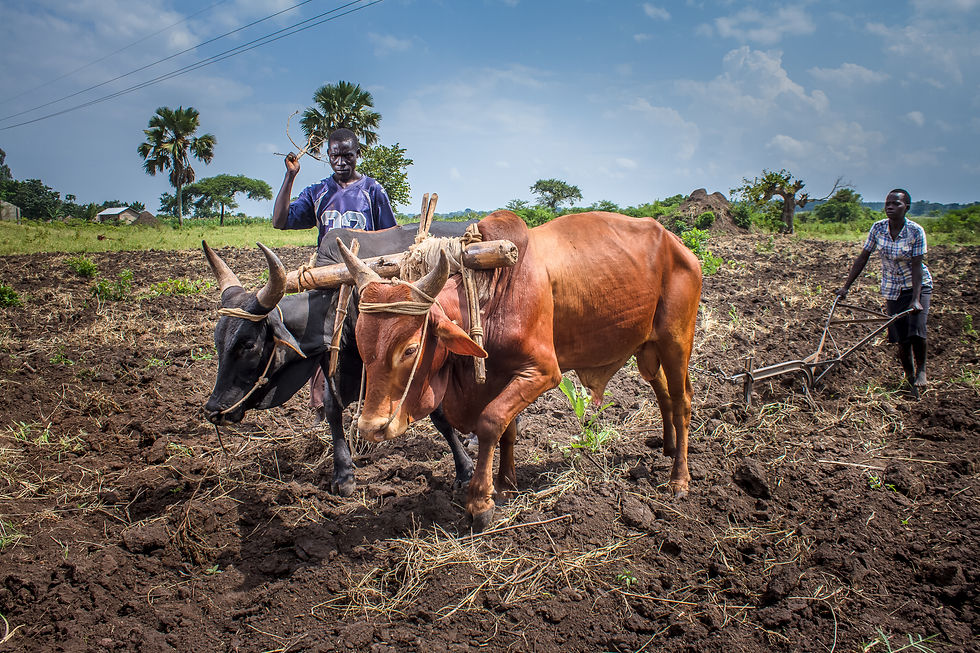Land Tenure Security Undermines Climate Action Among Small-Scale Women Farmers in Uganda.
- Julius Engwedu
- Mar 20
- 3 min read

Climate change is an undeniable reality for farming communities worldwide, and Uganda is no exception. With temperatures projected to rise by 0.6 to 1.5 degrees Celsius between 2023 and 2039 (World Bank, 2021), small-scale farmers—who make up over 80% of Uganda’s agricultural workforce—are on the frontline of climate shocks. Among them, women, who contribute approximately 88% of food production (EPRC, 2024), face the brunt of climate change due to insecure land tenure. Without control over the land they cultivate, their ability to invest in climate adaptation and build sustainable livelihoods is severely constrained.
The Reality of Insecure Land Tenure for Women Farmers
Despite being the backbone of Uganda’s agriculture sector, many women farmers do not own the land they farm. Cultural norms dictate that woman primarily access land through inheritance or as gifts from their husbands. Female-headed households, on the other hand, often struggle to purchase land due to financial constraints. This lack of ownership discourages investment in sustainable farming practices such as agroforestry, irrigation, and soil conservation—key strategies for climate adaptation.
The Climate Crisis and Its Regional Impact
Uganda’s climate has become increasingly unpredictable, with data from the Uganda National Meteorological Authority (UNMA) indicating rising temperatures, erratic rainfall, increased frequency of extreme weather events, soil degradation, and the emergence of new pests and diseases. Northern and eastern Uganda, where cultural norms heavily influence land access, are among the most affected regions. In these areas, women often face barriers to formal land ownership, making them more vulnerable to displacement, land grabbing, and exclusion from climate resilience programs, further exacerbating their socio-economic marginalization in the face of the climate crisis.
How Insecure Land Tenure Undermines Climate Adaptation
Insecure land tenure has direct and devastating consequences on climate adaptation, including:
Without land security, women hesitate to implement long-term strategies such as tree planting, agroforestry, or irrigation.
Conservation agriculture, organic farming, and soil restoration require commitment, but women without tenure security fear losing access to the land before they can reap the benefits.
Farmers with insecure land tenure struggle to access credit and resources, making it harder to recover from droughts, floods, and pest outbreaks.
Voices from the Field
Ms. Erach Praxeda, a member of Awinya Farmer Field School (FFS) in Apac District, shares: “Many women have invested in tree planting, only to be evicted by their husbands. This discourages others from making similar investments. Married women struggle to get approval from their husbands, while unmarried women have no choice but to buy land—a difficult task for many.”
Mr. Obuja Albert from Suube Village, Ofua Sub-county, Adjumani District, echoes this sentiment: “In our community, women and girls are considered a man’s property. They only get land if the family head allows it. Many women want to invest in irrigation and tree planting but fear losing access to the land.”
Recommendations for Strengthening Land Tenure and Climate Adaptation
To address the challenges of insecure land tenure and promote sustainable climate adaptation among small-scale farmers, Uganda must adopt a multi-pronged approach:
Strengthening Land Governance: Invest in capacity building for land governance structures, encourage land registration and titling, and ensure the legal protection of vulnerable groups.
Empowering Communities to Protect Their Land Rights: Provide legal assistance, educate communities on land rights, and support negotiations against land grabbing and unsustainable investments.
Promoting Secure Land Tenure for Women: Address discriminatory cultural practices and legal barriers that prevent women from owning and controlling land.
Investing in Climate-Smart Agriculture: Promote climate-resilient crop varieties, soil conservation techniques, water harvesting, and agroforestry through research institutions like the National Agricultural Research Organization (NARO).
Strengthening Access to Climate Information and Extension Services: Ensure timely and accurate climate information reaches all farmers, and expand extension services to promote climate-smart agricultural practices.
Facilitating Access to Financial Services: Develop financial products tailored to small-scale farmers that do not require land titles as collateral, enabling women and marginalized groups to invest in climate adaptation.




Comments